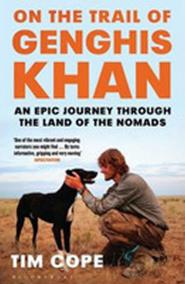On the Trail of Genghis Khan
The relationship between man and horse on the Eurasian steppe gave rise to a succession of rich nomadic cultures. Among them were the Mongols of the thirteenth century - a small tribe, which, under the charismatic leadership of Genghis Khan, created the largest contiguous land empire in history. Inspired by the extraordinary life nomads still lead today ...
Detaily o knihe
Počet strán: 533
Rozmer: 129x198x34 mm
Hmotnosť: 394 g
Jazyk: Anglicky
EAN: 9781408831304
Žáner: Angličtina - beletrie
Typ: Paperback
Zákazníci, ktorí si kúpili túto knihu, si kúpili aj...
O knihe
The relationship between man and horse on the Eurasian steppe gave rise to a succession of rich nomadic cultures. Among them were the Mongols of the thirteenth century - a small tribe, which, under the charismatic leadership of Genghis Khan, created the largest contiguous land empire in history. Inspired by the extraordinary life nomads still lead today, Tim Cope embarked on a journey that hadn't been successfully completed since those times: to travel on horseback across the entire length of the Eurasian steppe, from Karakorum, the ancient capital of Mongolia, through Kazakhstan, Russia, Crimea and the Ukraine to the Danube River in Hungary. From horse-riding novice to travelling three years and 10,000 kilometres on horseback, accompanied by his dog Tigon, Tim learnt to fend off wolves and would-be horse-thieves, and grapple with the extremes of the steppe as he crossed sub-zero plateaux, the scorching deserts of Kazakhstan and the high-mountain passes of the Carpathians. Along the way, he was taken in by people who taught him the traditional ways and told him their recent history: Stalin's push for industrialisation brought calamity to the steepe and forced collectivism that in Kazakhstan alone led to the loss of several million livestock and the starvation of more than a million nomads. Today Cope bears witness to how the traditional ways hang precariously in the balance in the post-Soviet world.











